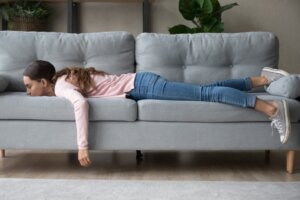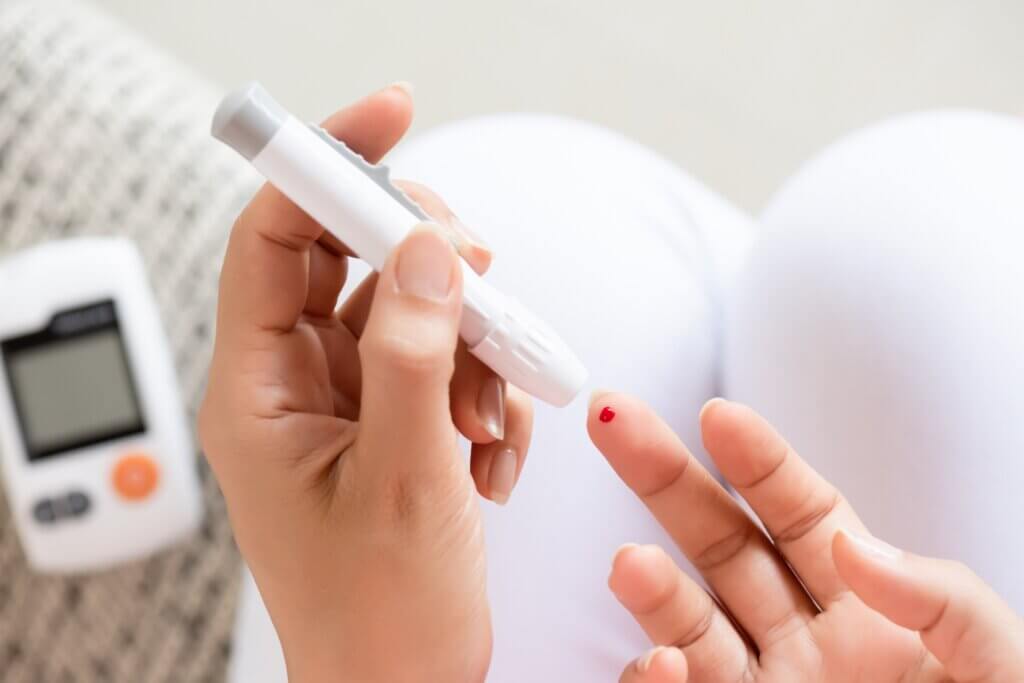Why Do I Accidentally Fall Asleep?

It’s common for people to accidentally fall asleep. Many people do it while watching television, reading a book, immediately after eating, or when they’re in front of their cell phone, tablet, or computer. There are many reasons why this can happen, and contrary to popular belief, narcolepsy is among the less common triggers. Today, we’ll review 7 causes of falling asleep without wanting to and some things you can do about it.
Narcolepsy is a rare phenomenon, as well as a very complex one. It’s estimated that 14 out of 100,000 inhabitants suffer from type 1 narcolepsy, while the number rises to 65.4 per 100,000 inhabitants for type 2 narcolepsy. Although it’s true that this may be the reason for excessive daytime sleepiness, the truth is that other explanations are more frequent. Let’s see what they are and what you should know.
7 reasons why you accidentally fall asleep
According to some estimates, up to 20% of the world’s population suffers from excessive daytime sleepiness. In fact, it’s one of the main reasons why a person turns to a sleep clinic. Most causes of unintentional falling asleep are due to day-to-day habits, although sometimes it’s a symptom of an underlying condition. We’ll review 7 reasons why people accidentally fall asleep.
1. Lack of a good night’s rest
As experts point out, one of the first consequences of sleep deprivation is sleepiness during the course of the day. An inability to sleep well during rest time means that the body hasn’t been able to recover from the effort made throughout the day. Sleep disorders often explain the lack of rest during the night, among which we can highlight the following:
- Circadian rhythm sleep disorders
- Sleep apnea
- Restless legs syndrome
- Insomnia
Narcolepsy is also a type of sleep disorder, so it’s also included among its causes. These problems are very common, and also cause stress, poor cognitive performance, difficulty concentrating, and irritability throughout the day. Most of the episodes of falling asleep without meaning to are explained by means of this pathway.
2. Drowsiness or postprandial fatigue

Researchers use the term postprandial fatigue to refer to poor mental and physical performance experienced after eating a large amount of food.
The exact cause of why people develop fatigue or drowsiness after eating remains unknown, although it’s thought to be due to a reduced blood supply to the brain (as a greater concentration of it is derived from the digestive system).
It’s for this reason that millions of people around the world take a nap after eating. Sleepiness or decreased energy may appear minutes or hours after eating. It usually only appears after the consumption of large portions (breakfast, lunch, and dinner), so snacks and small meals don’t inadvertently make you sleepy.
3. Overexertion throughout the day
Overexertions, such as that made by those who practice physical exercise, can also cause you to accidentally fall asleep. The relationship between fatigue and exercise is undeniable, and is sometimes a consequence of overtraining.
Fatigue and sleepiness not only occur after exercising but also after any activity that’s considered strenuous. Even low or moderate exertion can have an impact on people with a sedentary lifestyle.
4. Working hours
There’s evidence that certain working hours can cause unintentional sleep. That is, shift work, very long hours, and overtime.
Solo jobs, those that are very sedentary, or those that demand great physical effort can have the same effect. This translates into small moments throughout the day in which a sudden and almost uncontrollable sleepiness occurs.
As is to be expected, these episodes represent a great problem for the integrity of the worker, especially in manual or potentially dangerous jobs. Millions of people around the world report challenges of this type, so inadvertently falling asleep can be explained based on the characteristics of your workday.
5. Anemia
As experts point out, fatigue is a major component of anemia symptomatology. The sign can be so intense that it sometimes translates into extreme sleepiness throughout the day, so much so that it gives rise to episodes of falling asleep without wanting to.
Up to 90% of people with anemia develop this symptom, and it’s often accompanied by rapid heartbeat, pale skin, tiredness, shortness of breath, and brittle nails and hair.
6. Diabetes

Specialists point out that fatigue and sleepiness are as much a consequence of having diabetes as they are a consequence of the treatment for the disease. In addition to this, sleep disturbances are known to be very common in patients dealing with diabetes.
All this means that many of the people diagnosed with diabetes develop episodes of sleepiness throughout the day, almost always uncontrollably.
7. Thyroid disease
Lastly, thyroid disease (hyperthyroidism and hypothyroidism) can also cause you to accidentally fall asleep. The symptom is more frequent in hypothyroidism, as the reduction in hormone levels causes a slowdown in metabolism.
Other classic symptoms are cold intolerance, apathy, dry skin, dry hair, weight gain, constipation, and depression (among other conditions).
There are many other causes of falling asleep without wanting to, such as depression, stress, a sedentary lifestyle, diet, chronic pain, obesity, and neurological diseases. There’s no single reason for accidentally falling asleep, so consider all variables before pointing fingers.
Tips to avoid falling asleep accidentally
If episodes of this type are recurrent, don’t postpone your visit to a specialist. Do it especially when you detect other symptoms, or in any case when it’s beginning to affect your well-being in life. Professionals will determine the best roadmap to deal with the problem, but in the meantime, consider making the following lifestyle changes.
- Stick to precise times to get up and go to sleep
- Avoid eating and drinking for at least an hour before going to bed
- Condition your room to sleep better (light, noise, and other variables)
- Distribute your energies progressively throughout the day
- Avoid training or exercising more than your body can tolerate
- Control your stress levels
- Avoid sedentary life
- Restrict your naps to just 30 minutes
- Reduce the time spent using electronic devices
The above habits aren’t a magic recipe to avoid falling asleep accidentally, but we assure you that they’ll work in your favor to prevent episodes from controlling your life. We advise you to visit the doctor again, so you can rule out possible underlying conditions among its causes.
It’s common for people to accidentally fall asleep. Many people do it while watching television, reading a book, immediately after eating, or when they’re in front of their cell phone, tablet, or computer. There are many reasons why this can happen, and contrary to popular belief, narcolepsy is among the less common triggers. Today, we’ll review 7 causes of falling asleep without wanting to and some things you can do about it.
Narcolepsy is a rare phenomenon, as well as a very complex one. It’s estimated that 14 out of 100,000 inhabitants suffer from type 1 narcolepsy, while the number rises to 65.4 per 100,000 inhabitants for type 2 narcolepsy. Although it’s true that this may be the reason for excessive daytime sleepiness, the truth is that other explanations are more frequent. Let’s see what they are and what you should know.
7 reasons why you accidentally fall asleep
According to some estimates, up to 20% of the world’s population suffers from excessive daytime sleepiness. In fact, it’s one of the main reasons why a person turns to a sleep clinic. Most causes of unintentional falling asleep are due to day-to-day habits, although sometimes it’s a symptom of an underlying condition. We’ll review 7 reasons why people accidentally fall asleep.
1. Lack of a good night’s rest
As experts point out, one of the first consequences of sleep deprivation is sleepiness during the course of the day. An inability to sleep well during rest time means that the body hasn’t been able to recover from the effort made throughout the day. Sleep disorders often explain the lack of rest during the night, among which we can highlight the following:
- Circadian rhythm sleep disorders
- Sleep apnea
- Restless legs syndrome
- Insomnia
Narcolepsy is also a type of sleep disorder, so it’s also included among its causes. These problems are very common, and also cause stress, poor cognitive performance, difficulty concentrating, and irritability throughout the day. Most of the episodes of falling asleep without meaning to are explained by means of this pathway.
2. Drowsiness or postprandial fatigue

Researchers use the term postprandial fatigue to refer to poor mental and physical performance experienced after eating a large amount of food.
The exact cause of why people develop fatigue or drowsiness after eating remains unknown, although it’s thought to be due to a reduced blood supply to the brain (as a greater concentration of it is derived from the digestive system).
It’s for this reason that millions of people around the world take a nap after eating. Sleepiness or decreased energy may appear minutes or hours after eating. It usually only appears after the consumption of large portions (breakfast, lunch, and dinner), so snacks and small meals don’t inadvertently make you sleepy.
3. Overexertion throughout the day
Overexertions, such as that made by those who practice physical exercise, can also cause you to accidentally fall asleep. The relationship between fatigue and exercise is undeniable, and is sometimes a consequence of overtraining.
Fatigue and sleepiness not only occur after exercising but also after any activity that’s considered strenuous. Even low or moderate exertion can have an impact on people with a sedentary lifestyle.
4. Working hours
There’s evidence that certain working hours can cause unintentional sleep. That is, shift work, very long hours, and overtime.
Solo jobs, those that are very sedentary, or those that demand great physical effort can have the same effect. This translates into small moments throughout the day in which a sudden and almost uncontrollable sleepiness occurs.
As is to be expected, these episodes represent a great problem for the integrity of the worker, especially in manual or potentially dangerous jobs. Millions of people around the world report challenges of this type, so inadvertently falling asleep can be explained based on the characteristics of your workday.
5. Anemia
As experts point out, fatigue is a major component of anemia symptomatology. The sign can be so intense that it sometimes translates into extreme sleepiness throughout the day, so much so that it gives rise to episodes of falling asleep without wanting to.
Up to 90% of people with anemia develop this symptom, and it’s often accompanied by rapid heartbeat, pale skin, tiredness, shortness of breath, and brittle nails and hair.
6. Diabetes

Specialists point out that fatigue and sleepiness are as much a consequence of having diabetes as they are a consequence of the treatment for the disease. In addition to this, sleep disturbances are known to be very common in patients dealing with diabetes.
All this means that many of the people diagnosed with diabetes develop episodes of sleepiness throughout the day, almost always uncontrollably.
7. Thyroid disease
Lastly, thyroid disease (hyperthyroidism and hypothyroidism) can also cause you to accidentally fall asleep. The symptom is more frequent in hypothyroidism, as the reduction in hormone levels causes a slowdown in metabolism.
Other classic symptoms are cold intolerance, apathy, dry skin, dry hair, weight gain, constipation, and depression (among other conditions).
There are many other causes of falling asleep without wanting to, such as depression, stress, a sedentary lifestyle, diet, chronic pain, obesity, and neurological diseases. There’s no single reason for accidentally falling asleep, so consider all variables before pointing fingers.
Tips to avoid falling asleep accidentally
If episodes of this type are recurrent, don’t postpone your visit to a specialist. Do it especially when you detect other symptoms, or in any case when it’s beginning to affect your well-being in life. Professionals will determine the best roadmap to deal with the problem, but in the meantime, consider making the following lifestyle changes.
- Stick to precise times to get up and go to sleep
- Avoid eating and drinking for at least an hour before going to bed
- Condition your room to sleep better (light, noise, and other variables)
- Distribute your energies progressively throughout the day
- Avoid training or exercising more than your body can tolerate
- Control your stress levels
- Avoid sedentary life
- Restrict your naps to just 30 minutes
- Reduce the time spent using electronic devices
The above habits aren’t a magic recipe to avoid falling asleep accidentally, but we assure you that they’ll work in your favor to prevent episodes from controlling your life. We advise you to visit the doctor again, so you can rule out possible underlying conditions among its causes.
- Akerstedt T, Knutsson A, Westerholm P, Theorell T, Alfredsson L, Kecklund G. Organización del trabajo y sueño no intencional: resultados del estudio WOLF. Ocupar Environ Med . 2002;59(9):595-600.
- Ament W, Verkerke GJ. Exercise and fatigue. Sports Med. 2009;39(5):389-422.
- Kalra S, Sahay R. Diabetes Fatigue Syndrome. Diabetes Ther. 2018;9(4):1421-1429.
- Lehrskov LL, Dorph E, Widmer AM, et al. The role of IL-1 in postprandial fatigue. Mol Metab. 2018;12:107-112.
- Medic G, Wille M, Hemels ME. Consecuencias para la salud a corto y largo plazo de la interrupción del sueño. Nat Sci Sueño . 2017;9:151-161. Publicado el 19 de mayo de 2017.
- Pagel, J. F. Excessive daytime sleepiness. American family physician. 2009; 79(5): 391-396.
- Surani S, Brito V, Surani A, Ghamande S. Effect of diabetes mellitus on sleep quality. World J Diabetes. 2015;6(6):868-873.
- Sobrero A, Puglisi F, Guglielmi A, Belvedere O, Aprile G, Ramello M, Grossi F. Fatigue: a main component of anemia symptomatology. Semin Oncol. 2001 Apr;28(2 Suppl 8):15-8.
- Scheer D, Schwartz SW, Parr M, Zgibor J, Sanchez-Anguiano A, Rajaram L. Prevalence and incidence of narcolepsy in a US health care claims database, 2008-2010. Sleep. 2019 Jul 8;42(7):zsz091.
Este texto se ofrece únicamente con propósitos informativos y no reemplaza la consulta con un profesional. Ante dudas, consulta a tu especialista.







